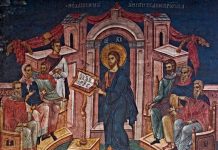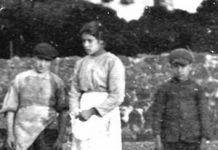Holy Week starts from Palm Sunday to end on Easter Sunday. Each and every single day has a special lesson to teach us.
Palm Sunday is the day wherein the Holy Week is inaugurated. As a community we go with Jesus, the King of Kings, to enter triumphantly in Jerusalem, the City of the Great King, on a donkey. In Zechariah 9 we find this extraordinary prophecy about the Messiah: Rejoice greatly, O daughter of Zion! Shout aloud, O daughter of Jerusalem! Lo, your king comes to you; triumphant and victorious is he, humble and riding on an ass, on a colt the foal of an ass (Zech 9:9). Lesson one: the great King enters so humbly in Jerusalem. On Palm Sunday of this year Pope Francis said: Dear brothers and sisters, Jesus entered Jerusalem as a humble and peaceful King. Let us open our hearts to Him. Only He can deliver us from enmity, hatred, violence, because He is mercy and the forgiveness of sins.
On Holy Monday, Jesus visits his friends at Bethany. Here Mary anoints Jesus with that famous precious oil, thus preparing him already for his burial some four days later. On this point Pope Benedict had this to say in his homily during the Holy Mass on the second anniversary of the death of Pope St John Paul II on Monday, 2 April 2007: The Gospel account impresses an intense paschal atmosphere on our meditation: the supper at Bethany is a prelude to Jesus’ death in the sign of his anointing by Mary, a homage she pays to the Teacher which he accepts as foretelling his burial (cf. Jn 12: 7). However, it is also an announcement of the Resurrection through the very presence of Lazarus restored to life, an eloquent witness of Christ’s power over death. Lesson two: Holy Week shows the prelude of Jesus’ resurrection from the death.
On the following day, Holy Tuesday, Jesus announces the betrayal of Judas and Peter’s denial, in Mark 14: And as they were at table eating, Jesus said, “Truly, I say to you, one of you will betray me, one who is eating with me.” They began to be sorrowful, and to say to him one after another, “Is it I?”
He said to them, “It is one of the twelve, one who is dipping bread into the dish with me.
For the Son of man goes as it is written of him, but woe to that man by whom the Son of man is betrayed! It would have been better for that man if he had not been born… And Jesus said to them, “You will all fall away; for it is written, `I will strike the shepherd, and the sheep will be scattered.’ But after I am raised up, I will go before you to Galilee.” Peter said to him, “Even though they all fall away, I will not.” And Jesus said to him, “Truly, I say to you, this very night, before the cock crows twice, you will deny me three times.” But he said vehemently, “If I must die with you, I will not deny you.” And they all said the same (Mk 14:18-21. 27-31). Lesson three: Jesus is betrayed and denied by his closest friends and collaborators.
On Holy Wednesday, which is also called, Spy Wednesday, Judas is busy trying to strike a deal with the chief priests of the Temple to betray his Master for thirty pieces of silver. Lesson four: We all betray and deny Jesus in one way or another. On April 8, 2020, Pope Francis said: Let’s think of the little Judases that we all have within ourselves. Every one of us is capable of choosing between loyalty and self-interest. We are each capable of betraying, of selling, of making choices based on our own interests. Where are you, Judas?
The subsequent day, Maundy Thursday, and the first day of the Paschal Triduum, Jesus makes his ultimate preparations for his Last Supper with the apostles. On this day Jesus gives us his important mandatum, or commandment, to love one another. It is within this context that He institutes the Eucharist and the ministerial priesthood. In his homily, given at the Vatican on March 20, 2008, during the Mass of the Last Supper on Holy Thursday at the Lateran’s Basilica of St John, Pope Benedict summed up the mystery of Holy Thursday by saying: Holy Thursday is a day of gratitude and of joy for the great gift of love to the end that the Lord has given to us. We want to pray to the Lord at this time, so that gratitude and joy may become in us the power of loving together with his love. Amen. Lesson five of the Holy Week is: Before going to his passion Jesus gave us himself in the Eucharist and instituted the sacrament of its ministers to make sure that His loving presence keeps being with us till the end of time.
On Good Friday, Jesus gives himself for us completely by undergoing his passion and death on the Cross. In his address at the general audience of 8 April 2009, Pope Benedict said: Christ’s death recalls the accumulated sorrow and evils that weigh upon humanity of every age: the crushing weight of our death, the hatred and violence that still today stain the earth with blood. The Passion of the Lord continues in the suffering of human beings. As Blaise Pascal has rightly written: “Jesus will be in agony even to the end of the world. We must not sleep during that time” (Pensées, 553). If Good Friday is a day full of sorrow, it is therefore at the same time a particularly propitious day to reawaken our faith, to consolidate our hope and courage so that each one of us may carry our cross with humility, trust and abandonment in God, certain of his support and his victory. The liturgy of this day sings: O Crux, ave, spes unica Hail, O Cross, our only hope! Lesson six: Holy Week reminds us that Jesus is still being slaughtered in countless innocent human lives. That is why we need to stand up and put a definite end to violence, hatred, enmity and so forth.
Holy Saturday, or the day of waiting, heralds to us the joyous fact that Christ descended into the dead to save them. In the ancient homily for Holy Saturday, whose author is unknown, Chris tells the imprisoned Adam: ‘I am your God, who for your sake became your son, who for you and your descendants now speak and command with authority those in prison: Come forth, and those in darkness: Have light, and those who sleep: Rise. Lesson seven: Holy Week empowers to put our hands in those of Christ who can bring us back to his life that is a life in abundance.
Lastly, on Easter Sunday we continue celebrating what we have started celebrating on the Easter Vigil, namely that Christ is resurrected once and for all and that his resurrecting light resurrects us from death to life. In this beautiful liturgy of the Easter Vigil people are baptized as well as confirmed. The Alleluia, the singing of the Gloria and the Church bells all ring the joy of Easter. On Easter Sunday we renew our baptismal promises at Mass and the 50-day season of Easter kicks off.
Regarding Easter Pope Benedict XVI said: At Easter we rejoice because Christ did not remain in the tomb, his body did not see corruption; he belongs to the world of the living, not to the world of the dead; we rejoice because he is the Alpha and also the Omega, as we proclaim in the rite of the Paschal Candle; he lives not only yesterday, but today and for eternity (cf. Heb 13:8). Thus, the eighth and final lesson of the Holy Week runs: With Christ we are introduced to the everlasting life wherein sin and its concomitant consequences are defeated the One who is himself the Alpha and the Omega.
There are countless other lessons which emanate from Holy Week the week. Perhaps, as these days of our salvation unfolds we can add our own too. Everything said, the previous eight lessons are simply tasters of the immense spiritual and existential richness Holy Week has in store for those who approach it with a humble heart who is ready to be changed in that Divine Heart who gave us itself to save us from evil and sin while putting us into the glory of eternal life.









